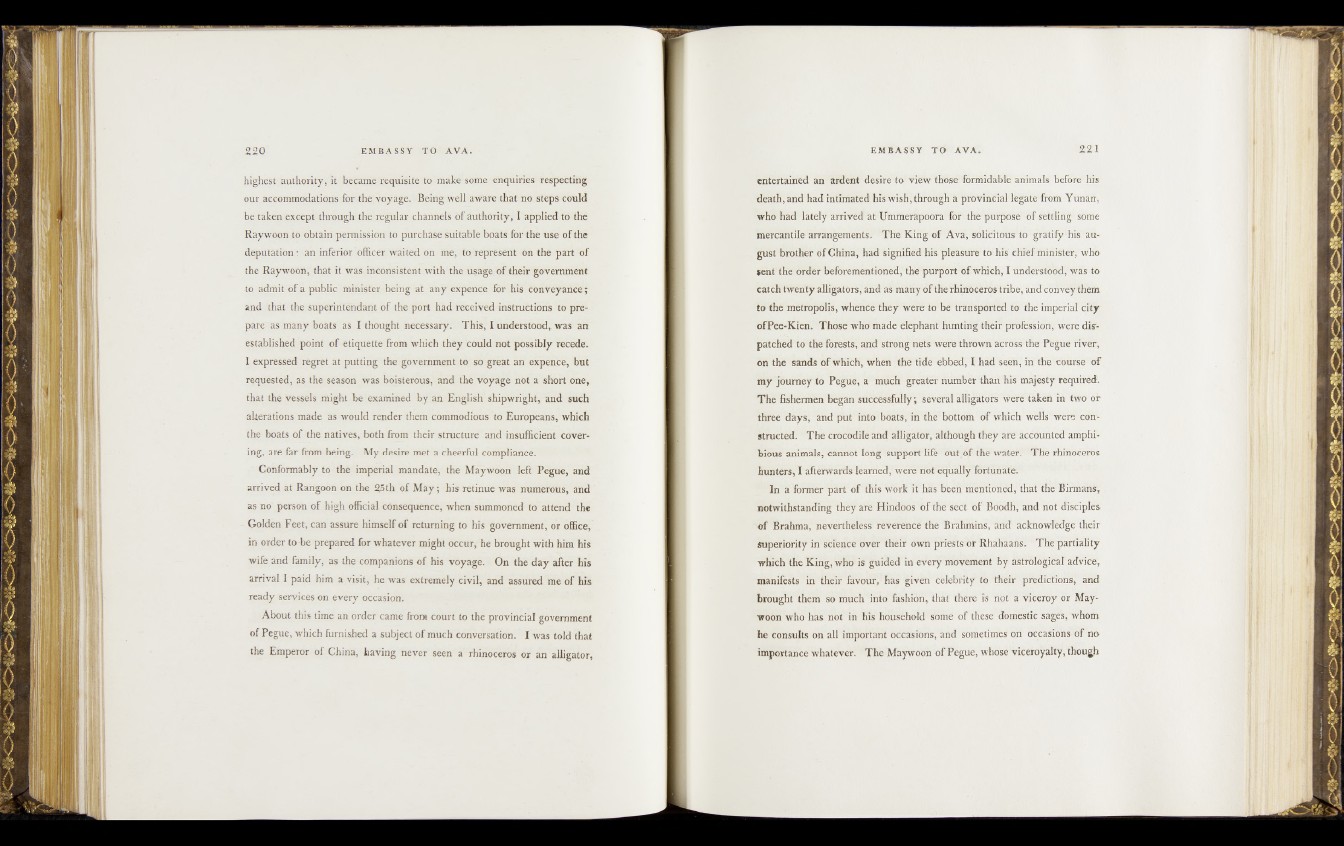
highest authority,'it bee'ame'requisite to make'some enquiries respecting
6ur accommodationsdór-the'voyage. Beingwell aware that no steps could
be taken except through'the regular channels of authority, Iappfrefttolthc
Raywoon to obtain permission to ptirehaSe suitable boats for the use of the
deputation: an inferior.bfficers waited on me, tqfreprgSènt'bn the part of
the Raywoon, that it was inconsistent with the usage of their government
to admit of a public minister, being at any expence for his Conveyance;
and that the superintondant of the port had received instructions to pre- .
pare";a§ many boats as I thought necëssa iy. This, I understood, was an
established point of etiquette from which they could not possibly recede.
1 expressed regret at putting the government to so great an ekpchcë, but
requested, as the season was boisterous, and the voyage not a short one,
ibat thé vessels might be examined by an English shipwright, and such
alterations made as would render them commodious to Europeans, which
the boats of the natives, both from their structure and insufficient covering,
are far from being. _My desire mét a cheerful compbance, f i
Conformably to the imperial mandate, the Maywoon left Pegue, and
arrived at Rangoon on the 25th of M ay ; his retinue was niftmOnals, and
as no person of high official consequence, when summoned to attend the
Golden Feet, can assure himself of returning to his government, or office,
in order to -be prepared for whatever might occur, he brought with him his
wife and family, as thé companions of his voyage. On thé day after his
arrival I paid him a. visit, he was extremely civil, and assured me of his
ready services on every occasion.
About this time an ördër came from coiirt to the provincial government
of Pegue, which furnished a subject of much conversation. I was told that
the Emperor of China, having never seen a rhinoceros or an alligator,
entertained an ardent$&esire to view those formidable animals bè^fe his
death, and had intimated his wish; through'a provincial legateTroih Yunaii,
who had lately arrrVeÖüat’SE®ib«%)ób’ferfd?fithe^piöp^stéwbf sfeltlihg1 sortie
ii8 |^ ttile attsingements. The Kifig of
gust brother of China, had signified his pleasure re*>His ffRief’minister, wife
sent theorcfêf Üeföreriientiórred,' the;purport- o f which, I understood!; was to
catch twenty alligators, and as many of tfie?Hin6èêrÖstepé,'andcbnvlyWem
to thé" metropolis, whence they‘were to be'trahspórfed to'HhO,fimperiaI city
ofPee-Kien. Those who'made elephant fiurilSri'g tfieir' professionfwere dis1-
patched to the forests, and strong nets were throwhaorSks^ne Pëgue rivèr,
on thé sands of which, when the"fide ebbed, I had s^bri,’ in' the Course of
my journey .to Pegue, a 'much g r e ^ i •number’fharfsHis majesty required.
The fishermen began succésSfulIy ; several alligators Were taken in two or
three days, and put into!boats, in the1 bottom‘b f which’wells weib!'ciffir'
structed. The crocodile and alligator, although tfiej’-are’ accóunted'ampKf-
bious animals, cannot long' support Kfê ciütjof the water?lj'The rhMbce'ros
hunters, ■ Éiè¥Wa:ïÖsdeaiïied;iW^':!fflP^liM ^@ #ui^®.0 v5'
In a former part of this work it has been memïÖnêS'y that the^Birfnafn^,
notwithstanding theif are Hindoos ofJtfie'*sêct bf Bo'bdh^arrd riatlclsciples.
of Brahma/ nevertheless5 reverehcë fhè ’Brahmins, aira" acknowledgè their
superiority ifi ^lfefife#!over their own priestswr'Rhahaans-. TnojJaYtiality
which the King, who is guided in every movement by É'stfólogicaï advice,
manifests in their favour; has given ce'IeDntjrto their‘•‘'^redicfibirS,' Snd
brought them so much into1“ fashion', ihaf théfêas nbtfafïweiSföy'èY May-
woon who has not in his' hoiisehold iföme of these domestic 'sa’ges, whoift
he consults on all impoftaht ö’dM^lfefs/hhd sbmetim’é^öïi oecasShMssof noimportance
whatever. The Maywoon of Pegue, whose viceroyalty, though